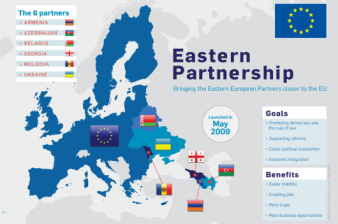
30/03/2015 10:05
The EU Eastern Partnership Needs More Attention to Security
By Vitalii Martyniuk. Atlantic community
On March 6-7, 2015, the EU Ministers of Foreign Affairs reached the conclusion that the EU Eastern Partnership (EaP) requires transformation and further development. The current situation in the EaP region, ongoing conflicts, and aggression against Ukraine demands more attention to the security dimension of the EU initiative. It is very important for the Eastern partner-countries to find ways to meet these key challenges, starting with the security sphere.
The time to update the Eastern Partnership has come. Firstly, it has been functioning for practically six years since 2009 and has not been reviewed since 2011. Secondly, the first essential results of this EU initiative have been achieved – in 2014 the EU Association Agreements were signed with Ukraine, Moldova and Georgia. Thirdly, the situation in the EaP region has dramatically changed after the aggression of the Russian Federation against Ukraine. Fourthly, the EU has already reviewed and entered corrections to its policy regarding Russia, which, in light of recent events, is no longer considered a reliable partner.
The current development of the situation in the EaP region has brought the security dimension to the foreground. Practically all the EaP countries except Belarus have conflicts within their territory with the potential to blow up at any moment. Presently, such an explosive situation can be found in the Transnistria region of Moldova, in Georgia with the Abkhazia and South Ossetia, Azerbaijan, and Armenia's Nagorno-Karabakh region. All the above-mentioned unrecognized republics suffer from poverty, backwardness of their economic development, and isolation. No program of the EU allows them to solve the existing economic, social, energy, cultural and other problems until the conflicts are settled.
The EU has already begun the appropriate work. According to the joint consultation paper of the European Commission and the EU High Representative, the consultations on further development of the EaP (as a part of the European Neighborhood Policy, ENP) were started on March 4, 2015. They are to be over by the end of June, and recommendations can be expected as early as in autumn.
The joint consultation paper brings up very important and complicated issues, the answers to which require fundamental changes or revision of the EaP. Some of these concern security issues: How should the ENP react to the conflicts and crises in the neighborhood? Should the Common Foreign and Security Policy (CFSP) and the Common Security and Defense Policy (CSDP) activities be better integrated into the ENP framework? Should it have a greater role in post-conflict actions? Should security sector reform be given greater importance in the ENP? The Partnership requires fundamental changes, which are to be based on the current situation in the region, and take into account the regional security challenges.
If the process of consultations fails to produce the answers to the mentioned questions, the EU might not improve its policy towards the EaP region. This can lead to the dysfunction of the Partnership. Consequently, it is very important for the Eastern partner-countries to find ways to meet these key challenges, starting with the security sphere.
It is reasonable that on the bilateral level of the relations between the EU and the EaP countries a security dimension is foreseen, especially with the countries which signed the Association Agreement. The agreement includes security points: enhancing the security cooperation; achieving peace, security and stability; conducting dialogue on security and defense; promoting the principles of independence, sovereignty, territorial integrity. At the same time, in the multilateral dimension of the EaP the security component is unjustifiably weak.
It seems that the EU member states are aware of the importance of guaranteeing security. The purpose to review the ENP, especially the EaP, is to guarantee that "the EU's policy in future will be able to support a more efficient development of the region of joint stability, security and prosperity".
The first results of the review of the EaP will probably be the center of attention at the next EaP Summit on May 21-22, 2015 in Riga, Latvia. It will be the first summit after waging the new aggressive war in the EaP region. The EU might start a serious reconstruction of its foreign and security policy in the Eastern direction in order to preserve the relations with the EaP countries.








